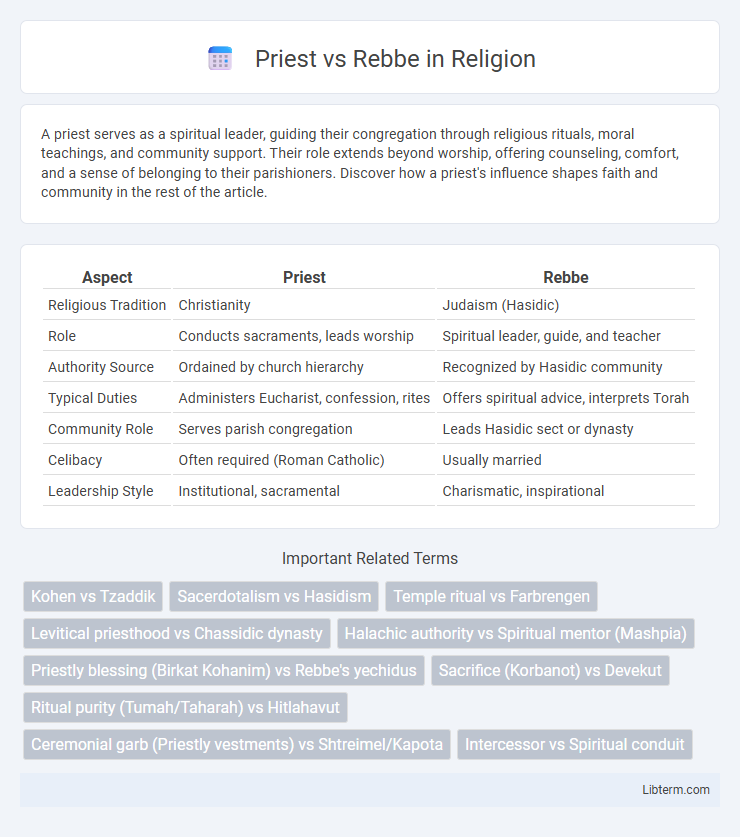A priest serves as a spiritual leader, guiding their congregation through religious rituals, moral teachings, and community support. Their role extends beyond worship, offering counseling, comfort, and a sense of belonging to their parishioners. Discover how a priest's influence shapes faith and community in the rest of the article.
Table of Comparison
| Aspect | Priest | Rebbe |
|---|---|---|
| Religious Tradition | Christianity | Judaism (Hasidic) |
| Role | Conducts sacraments, leads worship | Spiritual leader, guide, and teacher |
| Authority Source | Ordained by church hierarchy | Recognized by Hasidic community |
| Typical Duties | Administers Eucharist, confession, rites | Offers spiritual advice, interprets Torah |
| Community Role | Serves parish congregation | Leads Hasidic sect or dynasty |
| Celibacy | Often required (Roman Catholic) | Usually married |
| Leadership Style | Institutional, sacramental | Charismatic, inspirational |
Introduction: Defining Priest and Rebbe
A priest is a religious leader authorized to perform sacred rituals and mediate between humans and deities, commonly found in Christianity, Hinduism, and ancient religions. A Rebbe serves as a spiritual mentor and halachic authority within Hasidic Judaism, guiding followers in religious practice and personal growth. Both roles emphasize spiritual leadership but differ fundamentally in cultural context, rituals, and religious frameworks.
Historical Origins of Priests and Rebbes
Priests historically emerged from ancient religious systems as intermediaries between the divine and human communities, most notably within ancient Israelite, Egyptian, and Greek cultures, performing rituals and sacrifices to maintain spiritual harmony. Rebbes originate from Jewish Hasidic traditions beginning in the 18th century Eastern Europe, serving primarily as spiritual leaders and guides, emphasizing personal piety and mystical connection to God. Both roles reflect distinct religious and cultural evolutions, with priests aligned with sacrificial rites and temple worship, while rebbes embody charismatic authority and communal spiritual mentorship.
Religious Roles and Responsibilities
A priest in Christianity serves as an ordained minister who performs sacraments, leads worship, and offers spiritual guidance to the congregation. A Rebbe, primarily within Hasidic Judaism, acts as a spiritual leader, teacher, and intercessor, providing mystical insight and personal counsel to followers. While priests administer formal rituals and church sacraments, rebbes emphasize mentorship, Torah study, and maintaining a close relationship with their community.
Spiritual Leadership Styles
Priests typically serve as intermediaries in structured religious ceremonies, emphasizing sacramental duties and hierarchical authority within institutions such as the Catholic Church. Rebbes provide personalized spiritual guidance rooted in Hasidic Judaism, fostering intimate mentorship and communal bonding through teachings and mystical insights. The Priest's leadership often centers on ritual performance and doctrinal enforcement, while the Rebbe's approach emphasizes communal inspiration and direct interaction with followers.
Rituals and Ceremonies
Priests in Christianity conduct sacraments such as the Eucharist, baptism, and confession, serving as mediators between God and the congregation through established liturgical rituals. Rebbes in Hasidic Judaism lead communal prayers, Torah study, and celebrate Jewish festivals with mystical teachings, often providing personal blessings and spiritual guidance to followers. Both roles emphasize ritual importance, but priests focus on sacramental duties, while rebbes prioritize spiritual mentorship and Jewish law observance.
Educational Influence and Guidance
Priests primarily offer educational influence through formal religious instruction, sacraments, and parish-based catechism, guiding parishioners in church doctrines and moral teachings. Rebbes play a central role in Hasidic Judaism by providing personalized spiritual guidance, interpreting Torah teachings, and fostering communal values through oral tradition and mentorship. Both figures serve as pivotal educators, shaping faith understanding and ethical behavior within their respective communities.
Community Impact and Support
Priests serve as spiritual leaders within Christian communities, offering sacraments, guidance, and counseling that foster communal cohesion and moral development. Rebbes in Hasidic Judaism provide not only religious leadership but also personal mentorship and communal support, often acting as intermediaries between the divine and followers, strengthening social bonds and cultural identity. Both roles significantly impact their communities by promoting spiritual growth, social unity, and cultural continuity through tailored guidance and support systems.
Symbolism and Religious Authority
The Priest in Christianity symbolizes the mediator between God and humans, often depicted through vestments like the stole and chalice, representing sacramental authority to perform rites such as the Eucharist. The Rebbe in Hasidic Judaism embodies a spiritual guide and leader, symbolized by a traditional shtreimel or a beard, emphasizing divine wisdom and communal leadership. Both roles signify profound religious authority, yet while the priest administers formal sacraments, the Rebbe provides personalized spiritual mentorship and interpretation of Torah teachings.
Differences in Religious Traditions
Priests serve as religious leaders in Christianity, primarily responsible for conducting sacraments, leading worship services, and providing spiritual guidance within the church hierarchy. Rebbes, central figures in Hasidic Judaism, function not only as spiritual leaders but also as Torah scholars and community mentors, embodying a mystical connection to God and influencing daily life through teachings and blessings. The role of a priest emphasizes ritual duties and church sacraments, whereas the rebbe's role integrates spiritual mentorship with mystical interpretation and communal leadership.
Conclusion: Comparing Priest and Rebbe
A priest serves as a religious leader primarily within Christian traditions, performing sacraments and mediating between God and congregation, while a rebbe leads within Hasidic Judaism, offering spiritual guidance and interpreting Torah teachings. Priests often function within formal ecclesiastical hierarchies, whereas rebbes hold charismatic authority based on lineage and personal piety. The comparison highlights distinct religious roles shaped by differing theological frameworks and community functions.
Priest Infographic

 libterm.com
libterm.com